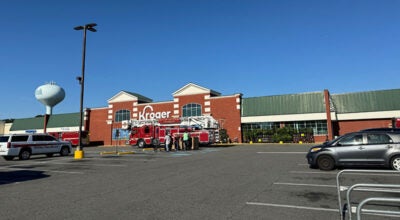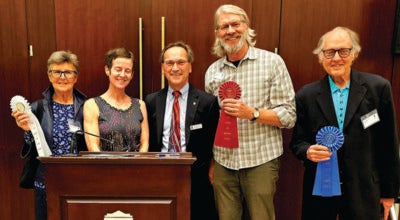Development site could revert to U.S. in emergency
Published 8:49 pm Saturday, August 4, 2012
An encumbrance in an early deed could, in the event of a national emergency, jeopardize the property rights of future investors in one of Hampton Roads’ last remaining prime waterfront developments, a legal scholar says.
Tidewater Community College and the city of Suffolk, which has a 55-acre parcel, plan to redevelop 444 acres in North Suffolk, west of the Monitor-Merrimac Memorial Bridge-Tunnel.
But a deed from 1960 shows a previous owner of the property agreed to cede control of it to the United States during a national emergency, which could complicate development plans the city and TCC Foundation have under way.
The property was a TCC campus between 1968 and the end of 2009, when a new Portsmouth facility opened.
Prior to 1968 it was known as Frederick College, owned and operated by the Foundation Boys Academy Ltd., and the Beazley Foundation Inc., nonprofit entities linked to the late Frederick W. Beazley, a Portsmouth philanthropist.
Earlier still, it was the U.S. Marine Corps Supply Forwarding Annex, which was deemed surplus to requirements after World War II.
The U.S. gave the academy 205 acres on July 7, 1960, on the condition it was used for educational purposes as described by the academy in an application for the land.
Twelve days later, the U.S. sold the foundation another 764 acres of the former Marines site for $1 million.
In the July 7 deed, the academy and “its successors and assigns” agreed to the right of the U.S. “during any period of emergency declared by the President, or by the Congress of the United States,” to “the full, unrestricted possession, control, and use” of any portion of the 205 acres, including additions and improvements.
Asked if the encumbrance would present a risk for future property owners in the event of a national emergency, Ilya Somin, associate law professor at George Mason University and editor of the Supreme Court Economic Review, stated in an email, “Briefly, I think the answer to your question is ‘yes.’
“This is not really even an issue of eminent domain. This is simply a right that the government has reserved to itself in the deed transferring the land.”
In a later phone interview, Somin said it would take a “major industrial conflict like World War II” to trigger the clause, an event “not that likely to happen” nowadays.
But future property owners would need to be made aware of the encumbrance out of normal property law requirements, he said.
“The real long-term effect of having this in the deed (is), when this property sells, it would probably sell for a slightly lower value than it would otherwise, depending on the market’s estimates … of how likely that outcome would come to pass,” he said.
Its executive director, Doug Smith, said the Tidewater Community College Real Estate Foundation “is comfortable that the restrictions have been released, either through the passage of time, or through release consent instruments that were recorded subsequently.”
The foundation board consists of TowneBank’s Lee Armistead; Earl Industries’ Jerry Miller; D.D. Jones Transfer’s Don Goldberg; Coldwell Banker Professional, Realtors’ Dorcas Helfant-Browning; and TCC Interim President Dr. Peter Spina, Smith stated in an email.
In March 1968, the Commonwealth of Virginia State Board for Community Colleges “unanimously approved the acceptance of the gift of Frederick College from the Beazley Foundation, and directed that its appreciation be expressed to the foundation for the gift of Frederick College,” meeting minutes state.
But before the “gift” — including about 721 acres — was transferred to the board on May 15, 1968, for the sum of “$10 plus other valuable considerations,” the academy secured release from a second encumbrance.
Also in the July 7, 1960 deed, ownership would revert to the United States if, at any time during a 20-year period, the property was used for anything other than the agreed educational purposes; it was resold, leased, mortgaged, encumbered or “otherwise dispose(d) of” without permission from the U.S. Department of Health, Education and Welfare or successor; or the academy failed to file regular reports with the department.
According to a deed of release dated Oct. 12, 1965, the academy paid $9,612.75 to cancel this clause; however “the release shall not modify, change or affect … the rights of the United States of America to repossession in the event of a national emergency to all properties conveyed by” the July 7, 1960 deed.
In another relevant legal document, the United States agreed to the academy’s gift of the site, and to release the academy, but not the property or premises, from conditions.
Though the Urban Land Institute in 2011 presented plans for an apartment, retail and office complex incorporating an open-air amphitheater, final plans for the site’s multi-million-dollar redevelopment are still to be finalized, Smith said.
Real estate consultant Robert Charles Lesser & Co. has been retained to assess “if there is any demand” for the development mix recommended by the ULI, he said, adding, “frankly, it’s a bit of a new day since that (assessment) was done.”
“They (the RCLC) are in the middle of performing that assessment and we should have the results of that probably early fall,” Smith said, adding that the next steps would include engaging another firm to plan the development and finding a development partner, while the market assessment remained fresh.
Another aspect in the redevelopment is decontamination by the U.S. Army Corps of Engineers of the former military site, which historians contend was used by Confederate forces even further back.
According to a report in July, site inspections at eight “areas of concern,” to evaluate the presence or absence of potential contaminants, are tentatively scheduled for completion through 2014.
Weston Solutions has been selected to complete the investigation, corps Public Affairs Specialist Gerald Rogers stated in an email.
Somin concluded that the national emergency encumbrance on the land is probably nothing unique. “I’m not a dealer in real estate, but I will say that it is not that unusual” for a grantor to retain rights to a property in a deed, and “it’s not unusual for the government to retain some type of rights like this when they give away defense facilities,” he said.
“It really comes down to how likely is it that they would exercise the right. My entirely speculative guess is I don’t think that’s likely to happen, but I could be wrong.”
Virginia Bueno, spokeswoman for the Naval Facilities Engineering Command, stated in an email, “The President together with Congress, and other national authorities, declare national emergencies that will result in unrestricted possession, control and use of the property.
“National emergencies are the result of events beyond our control, and are impossible to predict. Therefore we are unable to predict the likelihood of an event that would impact this issue.”
The city of Suffolk did not respond to a request for comment.






